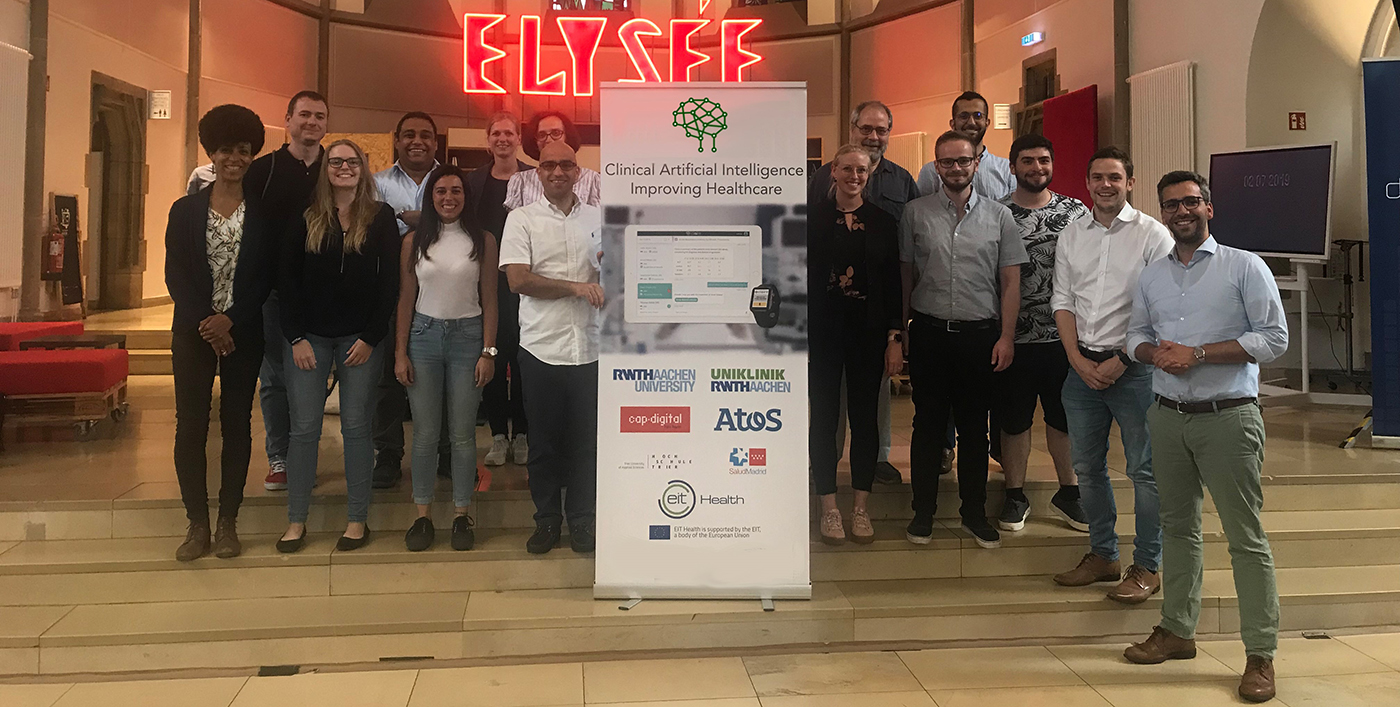Clinical Artificial Intelligence Improving Healthcare
Clinical Artificial Intelligence Improving Healthcare is like Alexa with a PhD. As medical data increases daily, doctors and nurses spend 50% of their time in front of computers. This project’s solution is a virtual medical assistant using Artificial Intelligence to support medical professionals in the Intensive Care Unit with documentation, disease detection and accurate, evidence-based treatment
Medical knowledge and health data volume double every three years. The complexity of accurate, evidence-based medicine increases steadily. Healthcare workers must deal with a mass of data and increasing documentation tasks. Meanwhile, relevant patient data is often covered under a layer of irrelevant “noise data”. A system that uses artificial intelligence to assist in data-related chores can help doctors and nurses, and free them to spend more time with patients.
Team
PD Dr. Lukas Martin and Dr. Arne Peine (University Hospital Aachen): overall project lead, assessment of clinical requirements and development of the user interface. Prof. Anke Schmeink (RWTH): Machine learning algorithms. Prof. Guido Dartmann (Hochschule Trier): Simulations. Cap Digital: definition of business plan and market strategy. ATOS SE: validation and preparation of medical certification. Dr. Mallaina (Hospital Niño Jesús Madrid): validation study and assessment of clinical requirements.
The project
The purpose of this project is to continue to develop a virtual healthcare assistant, an innovative solution to help healthcare professionals deal with increasing amounts of medical knowledge and data. With the support of EIT Health, the Clinical Artificial Intelligence Improving Healthcare project will bring the innovation to the patient: saving lives, time and costs through significantly improved overview of a person’s health, early diagnoses and accurate, evidence-based treatment.;
Our team of healthcare business experts, experienced doctors and artificial intelligence scientists will offer a breakthrough solution for the data problem at 158 000 intensive care beds in our target markets. We combine state-of-the-art advances of machine learning, natural language processing and artificial intelligence with an intuitive human interface.
Our broad experience in dealing with Big Data in all perspectives – business, research and medical – will enable our team to develop a certification-ready solution by the end of the project.
The overall goals of the project are:
- to bring the solution from prototype to a certification-ready software;
- to develop a needs-driven solution, tested by experts under real life conditions;
- to develop a sustainable business and distribution model for our spin-off, start-up company.
Along with helping medical professionals spend less time at the computer and more time interacting with the patients, the solution will help improve the treatment that doctors offer by intelligently dealing with masses of data. Treatment in an ICU with the support of the solution will lead to a shortened hospital length of stay and overall improved treatment quality. Patients, doctors and healthcare payers will benefit.
Why this is an EIT Health project
This project is in keeping with the EIT Health Focus Area of Creating the Enabling Environment for Healthcare Transformation, because it can improve healthcare management. It is also in keeping with the focus area of Harnessing the Power of Real World Data, because it turns data from a challenge to an advantage in treating patients.
Members

CLC/InnoStars: France
Partner classification: Business, Tech Transfer, Clusters, Other NGOs
Partner type: Associate Partner
Cap Digital is the French business hub for digital and ecological transformation and the biggest cluster in Europe. 1000 members including 830 startups / SMEs, 70 large companies, 70 academic, 12 VCs. Health / Well Being / Silver Economy as a target sector (150+ members). Education / Lifelong learning / HR as a target sector (150+ members). AR/VR/3D, IoT/Robotics, Big Data, AI as technologies (170+ members). Main actions: Energizing the ecosystem Accompanying experimentations Access to R&D public funding (regional, national, European) Providing intelligence Access to private funding Business Coaching International development
Key Activities in Business Creation
Business coaching, Testing & Validation
Key Activities in Education
Entrepreneurship training, training

CLC/InnoStars: Germany
Partner classification: Education, Research, Tech Transfer, Clusters, Other NGOs, Hospital / University Hospital
RWTH Aachen University and its hospital (focus on patient-oriented medicine & nursing care) provide leading research, innovation and education within the core themes of EIT Health. Our industry-need-driven competence centres foster entrepreneurship
RWTH Aachen University
RWTH Aachen University, Templergraben 55, 52062 Aachen, Germany
Key Activities in Research and Developement
Biomedical engineering, Life Sciences, Social sciences / health economics, Clinical research
Key Activities in Business Creation
Incubation, Technology Transfer, Testing & Validation
Key Activities in Education
Entrepreneurship training, Technical faculties, Medical faculties, Healthcare professional education/training


